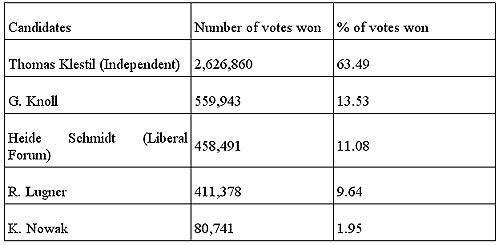Analysis
News
Corinne Deloy,
Fondation Robert Schuman,
Helen Levy
-

Available versions :
EN

Corinne Deloy
Fondation Robert Schuman
Helen Levy
On 25th April Austrians will elect the President of their Republic. He/She will take the place of Thomas Klestil, elected once on 26th April 1992 as member of the Popular Party (ÖVP) and then re-elected a second time on 19th April 1998 as an independent candidate.
The Presidency of the Austrian Republic is essentially a symbolic position. The President is the commander in chief of the army and appoints the ambassadors. It is also within his power to dissolve the National Council (Nationalrat), the lower Chamber of Parliament or to dismiss the federal government; but these are powers that he only uses if the organisms themselves make the suggestion.
The President is elected for six years and his mandate is renewable one time only. All candidates to the presidency must be at least thirty years old and have collated at least six thousand signatures from the electorate or have obtained the support of at least five members of the National Council.
Two people are officially candidates for the presidential position:
Benita Ferrero-Waldner, 55 years old, Popular Party candidate (ÖVP) and present Foreign Affairs Minister in Mr Wolfgang Schüssel's government;
Heinz Fischer, 65 years old, Social Democrat Party candidate (SPÖ) and present vice-president of Parliament.
Any candidate who collates more than half of the votes is elected after the first round. A second round is organised if none of the candidates manages to achieve this result. If this is the case a new candidate may replace one of those who stood in the first round.
If only one candidate stands a referendum is organised. This measure was established in 1982 in order to prevent the election of a President who had not undertaken a real electoral campaign.
It is obligatory to vote in this election in the four Länder of Tyrol, Carinthia, Styria and Vorarlberg.
For a while Franz Fiedler, president of the Auditors Court had planned to stand in this election but finally withdrew his candidature. Franz Fiedler a member of the Popular Party was supported by Jörg Haider's Liberal Party (FPÖ). In justification of his withdrawal he said that he was not able "to name the guarantors who wanted to finance his campaign". For his part Wolfgang Pötl, owner of an erotic telephone line, could not stand since he did not collate the necessary number of signatures.
On 17th March Benita Ferrero-Waldner declared that she would accept Jörg Haider's entry into government if she were elected President of the Republic. "If he has won democratic legitimacy I would certainly be kind to him. The President must accept the oath of anyone who is able to form a government," she declared. In February 2000, President Thomas Klestil was opposed to the Liberal Party leader entering the cabinet led by Wolfgang Schüssel. On 8th April last the Social Democrat Party candidate also confirmed that he might accept Jörg Haider's oath. "There is no reason to say that such and such a party might not be represented in government, elections are democratic in Austria and the results must be acknowledged," declared Heinz Fischer.
Just a few weeks before the European elections and the regional elections in Voralberg, the presidential election on 25th April will be the chance to assess the power struggle that is going on between the different Austrian political movements and to gauge the popularity of Chancellor Wolfgang Schüssel.
Reminder of the results of the Austrian Presidential Election on 19th April 1998:
Participation rate: 73.85%
 Source : Les pays d'Europe occidentale, n° 5 097-98, Paris, La Documentation française, 1999
Source : Les pays d'Europe occidentale, n° 5 097-98, Paris, La Documentation française, 1999On the same theme
To go further
Elections in Europe
Corinne Deloy
—
15 April 2025
Elections in Europe
Corinne Deloy
—
25 February 2025
Elections in Europe
Corinne Deloy
—
18 February 2025
Elections in Europe
Corinne Deloy
—
28 January 2025

The Letter
Schuman
European news of the week
Unique in its genre, with its 200,000 subscribers and its editions in 6 languages (French, English, German, Spanish, Polish and Ukrainian), it has brought to you, for 15 years, a summary of European news, more needed now than ever
Versions :



